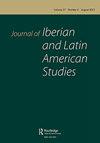1900年前后西班牙的电力、民族认同和复兴
IF 0.3
0 HUMANITIES, MULTIDISCIPLINARY
Journal of Iberian and Latin American Studies
Pub Date : 2023-01-02
DOI:10.1080/14701847.2023.2184007
引用次数: 1
摘要
本文分析了在国家(和帝国)衰落的背景下,电力和电气技术如何被用来产生一系列关于国家复兴的叙事。它将遵循“电气时代”的到来在一群西班牙工程师中引发的争论,这些工程师于1902年出版了《科学与工业的结合》一书España al subir al trono S.M. el Rey Don Alfonso XIII。这份出版物是写给年轻的君主的备忘录,旨在鼓励西班牙有前途的电力应用。作为国际社会的一员,工程师们接受了所谓的电力普及承诺,但根据西班牙的当地情况进行了调整。因此,通过这本书,他们将电气化技术和电力作为文化资源,重新塑造了民族认同,建立了新的现代性的基础。通过分析西班牙工程师如何构思能源与国家未来之间的关系,本文旨在通过技术史(特别是技术民族主义的历史)和电力和能源的文化史来丰富西班牙民族主义的史学。本文章由计算机程序翻译,如有差异,请以英文原文为准。
Electricity, national identity and regeneration in Spain around 1900
ABSTRACT This article analyses how electricity and electrical technologies were used to generate a whole series of narratives about national regeneration in a context of national (and imperial) decline. It will follow the debates that the advent of the “electrical era” triggered among a group of Spanish engineers that in 1902 published the book La ciencia y la industria eléctrica en España al subir al trono S.M. el Rey Don Alfonso XIII. The publication acted as a memorandum addressed to the young monarch aimed at encouraging the promising applications of electricity in Spain. As members of an international community, engineers embraced the alleged universal promises of electricity but adapted them to Spain’s local conditions. Accordingly, through the pages of the book they used technologies of electrification and electricity as cultural resources to refashion national identity and establish the foundations of a new modernity. By analysing how Spanish engineers conceived the relationship between energy and the future of the nation, this article aims at enriching the historiography of Spanish nationalisms through the lenses of the history of technology (particularly, histories of techno-nationalism) and cultural histories of electricity and energies.
求助全文
通过发布文献求助,成功后即可免费获取论文全文。
去求助
来源期刊

Journal of Iberian and Latin American Studies
HUMANITIES, MULTIDISCIPLINARY-
CiteScore
0.40
自引率
33.30%
发文量
23
 求助内容:
求助内容: 应助结果提醒方式:
应助结果提醒方式:


